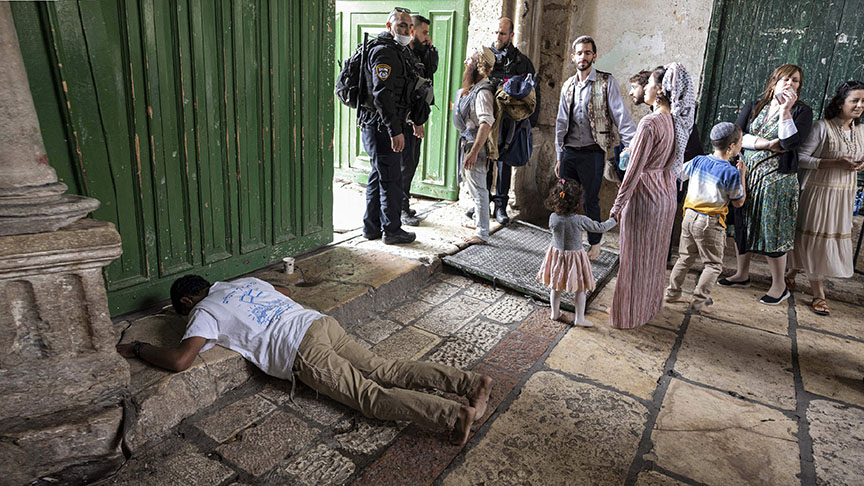
For more articles from The Media Line, click here.
The Jerusalem District Court late on Wednesday overturned a lower court ruling that reignited hostilities over the Temple Mount, known to Muslims as Haram al-Sharif, after appearing to permit non-Muslim worship at the site in violation of the status quo.
Hostilities escalated after a ruling of the Jerusalem Magistrates’ Court on Sunday overturned a police order barring three Jewish minors from the capital’s Old City for praying on the Temple Mount.
The teenagers, who were visiting the Temple Mount, prostrated themselves and recited the Shema prayer, in violation of the “status quo,” which does not permit non-Muslims to pray at the site. In turn, a police order banned the minors from the Old City for 15 days on the grounds that they had disturbed the peace and behaved provocatively.
Judge Zion Saharay on Sunday argued that the boys had not “raise[d] worry of harm befalling national security, public safety, or individual security.”
This provoked a strong backlash from the Palestinian Authority and Jordan, whose religious trust, the Islamic Waqf, acts as custodian of the site.
PA President Mahmoud Abbas condemned the Magistrates’ Court decision as “a grave assault against the historic status quo … and a flagrant challenge to international law.”
Now, the original police ban has been reinforced by the appeals court, with Judge Einat Avman-Muller ruling in favor of the minors’ ban. “The special sensitivity of the Temple Mount cannot be overstated,” she said.
The judge decreed that security concerns should be of paramount importance and that Jewish worship “should be superseded by other interests, among them the safeguarding of public order.”
The status quo arrangement refers to several implicit and explicit historical agreements, one of which can be traced to the aftermath of the 1967 war, when the Israeli government entrusted the guardianship of the site to the Islamic Waqf religious authorities.
While Israel retains jurisdiction over security concerns, the Waqf prohibits Jews from praying at the site.
Rashid Khalidi, editor of the Journal of Palestine Studies and Edward Said Professor of Modern Arab Studies at Columbia University, told The Media Line the Magistrates’ Court ruling was a violation of the status quo.
“Under the status quo, as established under the Ottomans, and as consecrated by the League of Nations Mandate for Palestine and the 1947 partition resolution, UNGA 181, the entire Haram al-Sharif is a Muslim shrine,” he said.
Khalidi pointed to the language of UN General Assembly Resolution 181 as demonstrating the explicit and binding nature of the resolution with respect to Muslim religious sovereignty over the site. According to the resolution, “Existing rights in respect of Holy Places and religious buildings or sites shall not be denied or impaired.”
As such, Khalidi argues that permitting Jewish worship at the site is a violation of international law.
“Any violation of this status quo is a violation of international law, whatever an Israeli domestic court may say.”
He added that the “status quo” unilaterally established by Israeli Defense Minister Moshe Dayan in 1967 “does not have the force of law.”
Yuval Shany, a professor of public international law at the Hebrew University of Jerusalem and is a former chair of the UN Human Rights Committee, a panel of scholars who review compliance of member states with the International Covenant on Civil and Political Rights, suggested that the situation is rather more ambiguous.
The Magistrates’ Court ruling was a very specific measure, pertaining exclusively to the three minors in question, he said.
“It’s a specific ruling, by a specific judge, in a specific case,” he explained. “As long as it was not endorsed by higher courts, it’s not a precedent.”
The ruling was not endorsed by higher courts, and it was overturned on Wednesday.
In any case, Shany posited that the Magistrates’ Court ruling may have been too particular to constitute a violation of international law.
“One could say that international law doesn’t regulate an issue of that specificity, because under international law you could say everyone has a right to worship, so the right to worship is a universal right.”
Prime Minister Naftali Bennett’s office had publicly stated that the ruling would be appealed to the District Court.
In a statement on Sunday, Bennett declared that “there is no change, nor is any change planned, on the status quo of the Temple Mount.”
However, many have argued that the concerns of Palestinians are not unfounded. According to Peace Now, an Israeli NGO that promotes a two-state solution, the number of visits by non-Muslims has increased incrementally over the past two decades.
“Until 2000, it was limited to groups of five or fewer; starting in 2003, the group size was increased to 10 people; in 2010, it was increased to 20 people; in 2011, it was increased to groups of 50 people at a time,” Peace Now said.
Moreover, whereas prior to 2003, the Waqf controlled non-Muslim visitors’ access to the site, the disintegration of Israeli-Waqf relations means that Israel now largely controls all aspects of it.
Shany explained why the Magistrates’ Court ruling has raised concerns.
“The judge basically said that he cannot conceive that exercising the right to pray on the Temple Mount would be deemed as a breach of the peace, and he noted that the police chief himself basically said that Israelis were committed to preserving the right to practice religion, to worship, for all, on the Temple Mount. And he construed this as an indication that this also applies to Jews,” the professor said.
Moreover, those organizations collectively known as the Temple movements have in recent years increased attempts to undermine the status quo and reassert Jewish sovereignty over the Temple Mount. While some only want to reclaim the right to Jewish prayer at the site, others envision the building of the Third Temple, and concurrent destruction of Haram al-Sharif.
As Shany explained to The Media Line that the issue has become so explosive because, “look, this is happening against the context of certain Jewish organizations that are basically trying to challenge the status quo, and this is part of that challenge.”
“The fact that the judge implicitly was sympathetic [to the Jewish worshippers], is for them an achievement, but it’s a very small achievement after a very long time,” he added.
The District Court ruling comes as a relief to many Jerusalemites after Israel Police chief Kobi Shabtai announced on Monday that the annual Jerusalem Day Flag March would go ahead as planned, and follow its traditional route, part of which goes through predominantly Palestinian areas, including the Old City’s Damascus Gate and Muslim Quarter.
“The Israel Police will maintain the freedom of worship, protest, and expression, for everyone. This is the role of the police in a country that values freedom and democracy,” Shabtai said.
In response, Hamas leader Ismail Haniyeh threatened the marchers.
“I want to clearly warn the enemy against committing these crimes and these steps. The Palestinian people, led by the resistance – especially those in the West Bank and Jerusalem – will not permit this Jewish, Talmudic rubbish to go unanswered,” he said.
Israeli authorities subsequently announced that the number of marchers following the traditional route through Damascus Gate and the Muslim Quarter to the Western Wall Plaza will be limited to 8,000. An equal number will be permitted to reach the Western Wall via Jaffa Gate.
Other participants are to celebrate Jerusalem Day outside the wall of the Old City, near Jaffa Gate.
Aron Rosenthal is a student at the University of Edinburgh and an intern in The Media Line’s Press and Policy Student Program.






















 More news and opinions than at a Shabbat dinner, right in your inbox.
More news and opinions than at a Shabbat dinner, right in your inbox.